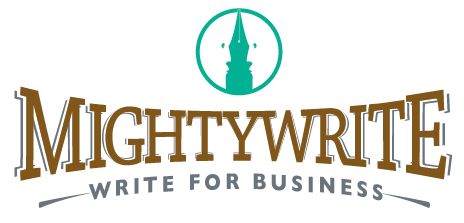By Leanne Fournier
“As survivors we talk with our scars, ask us about our scars, we’ll talk to you about them.” This was one of the powerful statements that emerged during the Azhe-mino gahbewewin/Reconciliation Kenora Research Project and Debwewin Truth Project meeting, held at the Super 8 in Kenora, Ontario on Thursday, October 12.
The meeting was titled “Booshkegiin Kenora – It’s up to you” – and brought together Indigenous elders, and community members from all walks of life to talk about the past, present and future of reconciliation and belonging in Treaty #3 territory.
The hosts for the meeting were Jeff Denis, the lead researcher from McMaster University for Azhe-mino gahbewewin, and Kenora Moving Forward (KMF), who led the Debwewin project in partnership with Ogimaawabiitong (Kenora Chief’s Advisory).
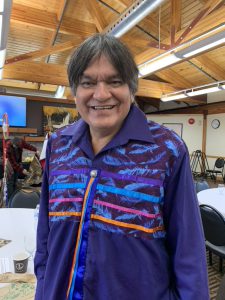
“Ed Mandamin’s comment about scars really stood out for me,” said Elauna Boutwell, KMF’s community coordinator, who leads the Coalition’s efforts to provide safe spaces of belonging for Kenora’s large and mostly Indigenous street population. “Often what people are judged by are their scars – it’s that outburst, that anger, that broken window, that fight – those are the scars people are speaking with, but where are those scars coming from? That’s what we need to be looking at.”
Ed wasn’t the only survivor to share his scars. Timmy Kent is one of Kenora Moving Forward’s peer workers from the street community who also spoke at the meeting. He is an intergenerational survivor of the Indian Residential School system who spent all of his youth in foster care. He hoped people got his message. “That whole thing about Indian Residential Schools – in my family, everyone’s been affected by it, my grandpa was in residential school, my mom was in residential school. I wanted to tell a little bit about myself to let people know that it’s real. The residential schools [screwed] up lots of people.”
Kent’s deep losses related to Indian Residential Schools is something Boutwell sees on the streets all the time. “Residential Schools took away home and that sense of belonging. People don’t feel they belong in the Anishinaabe world, and not in the white world – they don’t feel they belong anywhere. That’s at the core – the harm of having home taken away, the harm of having belonging taken away – how do we reconcile that?”
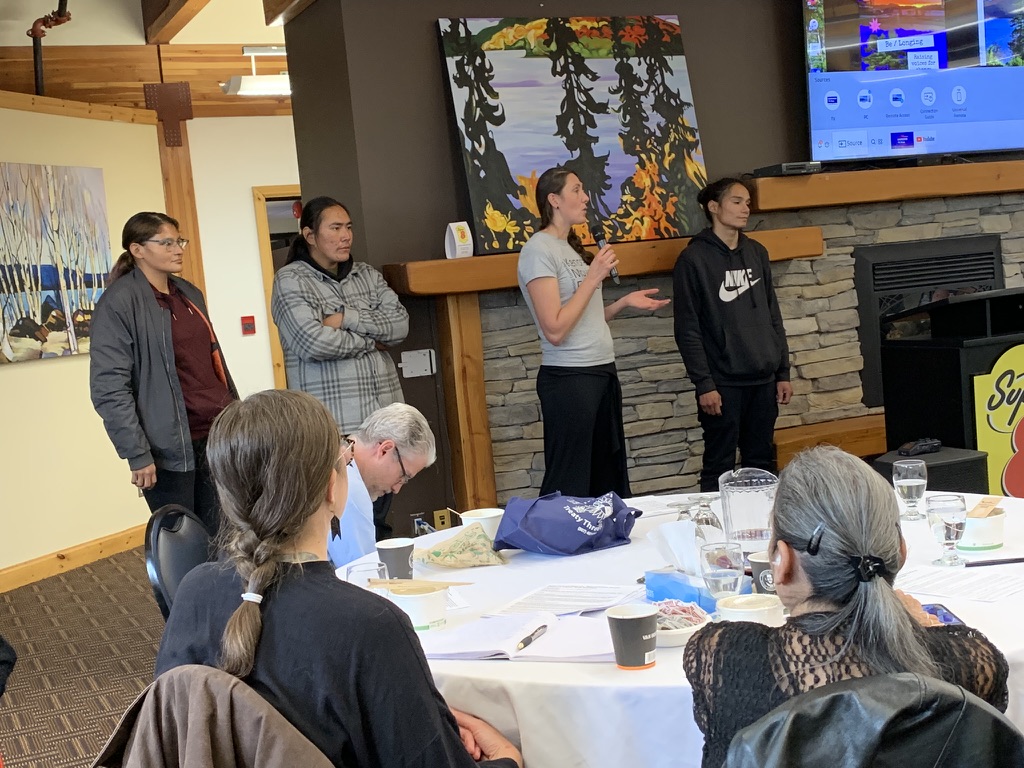
This came up often during the day, with others stressing the need for “land back” (referring to city and Crown lands that could be returned to Indigenous people), more education in the schools, so as one participant said, “we can all walk together”, more support for Anishinaabemowin language revitalization, and the need for greater respect for the land and water, an inherent part of Indigenous life, values and healing.
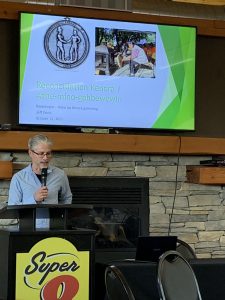
These points are consistent with the key findings of Denis’ research. “Connections with land came up in many interviews. Reconciliation is in part a personal journey of healing, and many Anishinaabe talk about their relationship with land. Environmental destruction in this area needs to be addressed for a full vision of reconciliation to go forward.”
KMF’s presentation, entitled “Be/Longing” got to the heart of this, with vulnerable community members sharing the barriers they face every day to feel like they belong. The presentation highlighted the fact that Kenora has the third highest per-capita population of homeless people in the province. The zine also shared how KMF relies on those with lived experience of homelessness – “experts by experience” and “peers” – to provide invaluable insights into the challenges, complexities and realities of being unhoused.
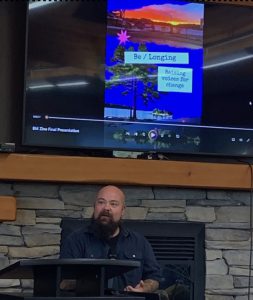
These “peers” talked about how much it meant for them to feel accepted and valued: “When I feel belonging, I feel safe. I can be myself, speak up. I accept responsibilities and have a role that’s important to me. I show up for the people I care about. I’m a role model and a mentor. When I belong, I’m home.”
Denis’ research project was much larger, conducted over four years and involving dozens of interviews with both Indigenous and non-Indigenous participants. The goal was to better understand what reconciliation means to Kenora-area residents, barriers to reconciliation, and actions needed to advance reconciliation. It is hoped that this information will inform a strategic action plan to improve relationships in the region.
Denis sees both projects as undeniably connected by two common themes.
“One is about belonging and home as seen through Kenora Moving Forward’s work with people on the street,” he said. “The other is reconciliation, what that means and ways to move forward. If reconciliation is going to be meaningful, we have to address the needs of the people most impacted by colonization, people who have been the most marginalized, those living on the streets, displaced from their homes and the land. That’s a direct connection – those issues need to be addressed if we’re going to talk about reconciliation.”
Lana Ogemah is one of KMF’s peer workers who contributed to the Debwewin project and spoke during the meeting. Afterward, Ogemah said, “I wanted people to know how much KMF has helped me change the way I look at my life. I was in a very dark place, but volunteering and being around people all the time got me out of that. I wanted people in the room to take away that change is possible, and hope is out there.” Kent also spoke about his work with KMF. “I wanted to let people know that KMF is part of my life now, and it’s good to be part of something.”
Participants felt empowered by the level of support in the room, which included Grand Chief Francis Kavanaugh, and other respected community members, including Tania Cameron, Geraldine Kakeeway, Erwin Stach, Cuyler Cotton, Tommy Keesick, Jeanette Skead, Robert Greene, Howard Copenace, Sherry Copenace, Ed Mandamin, and Cathy Lindsay to name a few.
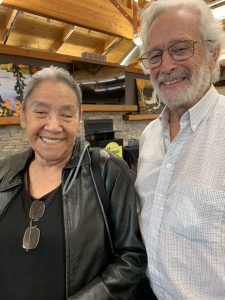
Many were disappointed that more “settlers”, particularly community leaders, hadn’t attended. However, of this, Sherry Copenace said, “We can’t force another human being to do anything. Hopefully some solutions come out of this; we need to move forward. We don’t have to wait for them.”
Those in the room were also saddened to learn that Kenora Moving Forward is looking for space and funding to continue. Denis sees this as critical.
“KMF really is a mechanism for addressing reconciliation. The people in KMF are doing critical things; more resources should be going toward it.”
Ogemah agrees about the value and necessity of KMF’s continuing work. “It’s so important to have a space to belong, work, be mentors, and keep busy.” She and Kent both hope the Coalition isn’t going away forever, as has been the case for many of the other organizations and movements focused on reconciliation over the years. Ogemah says she refuses to give up that hope .
KMF is working on a fundraising plan and continues its search for CommUnity Space. Donations are gratefully accepted. You can click on Kenora Moving Forward on the Waasegiizhig Nanaandawe’iyewigamig Health Access Centre’s (WNHAC) Canada Helps page at: canadahelps.org/en/charities/wassay-gezhig-na-nahn-dah-we-igamig. Your donation will help KMF continue to pay staff and peer workers to support our community’s most vulnerable – space or no space. (Canada Helps issues tax receipts and only 2% is deducted from your donation to cover their processing fee.)
The Azhe-mino gahbewewin/ Reconciliation Kenora Research Project report will be finalized based on feedback from the October 12 gathering and will be made public in 2024. Requests for information can be sent to denisj@mcmaster.ca.
KMF’s zine is available at youtube.com/watch?v=zJW7ztS4DvQ&t=24s.
If you’d like to learn more about Debwewin or other ways to support Kenora Moving Forward, email kenoramovingforward@gmail.com.
